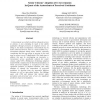Free Online Productivity Tools
i2Speak
i2Symbol
i2OCR
iTex2Img
iWeb2Print
iWeb2Shot
i2Type
iPdf2Split
iPdf2Merge
i2Bopomofo
i2Arabic
i2Style
i2Image
i2PDF
iLatex2Rtf
Sci2ools
104
click to vote
HICSS
2005
IEEE
2005
IEEE
Senior Citizens' Adoption of E-Government: In Quest of the Antecedents of Perceived Usefulness
E-Government, as a vehicle to deliver enhanced services to citizens, is now extending its reach to the elderly population through provision of targeted services. In doing so, the ideals of ubiquitous e-Government may be better achieved. However, there is a lack of studies on eGovernment adoption among senior citizens, especially considering that this age group is growing in size and may be averse to new IT applications. This study aims to address this gap by investigating an innovative eGovernment service specifically tailored for senior citizens, called CPF e-Withdrawal. Technology adoption model (TAM) is employed as the theoretical foundation, in which perceived usefulness is recognized as the most significant predictor of adoption intention. This study attempts to identify the antecedents of perceived usefulness by drawing from the innovation diffusion literature as well as age-related studies. Our findings agree with TAM and indicate that internet safety perception and perceived e...
Biometrics | HICSS 2005 | Senior Citizens | Significant Predictors | System Sciences | Technology Adoption Model |
| Added | 24 Jun 2010 |
| Updated | 24 Jun 2010 |
| Type | Conference |
| Year | 2005 |
| Where | HICSS |
| Authors | Chee Wei Phang, Yan Li, Juliana Sutanto, Atreyi Kankanhalli |
Comments (0)

